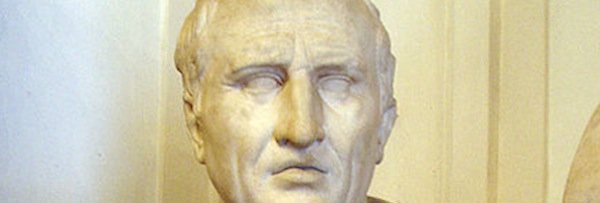Cicero, several editions (Project Gutenberg)
Titus Pomponius Atticus (112/109 BC-35/32 BC) was an editor, banker, art collector, and patron of letters, and Cicero’s closest friend. Their letters are known for their political observations, and were often written in subtle code to prevent public censure.
This excerpt is typical, written from Cicero on his way to Rome in December 60 B.C. The translation is by Evelyn Shuckburgh on Project Gutenberg:
I now come to January and my “political attitude,” in which, after the manner of the Socratics, I shall put the two sides; at the end, however, as they were wont to do, the one which I approve. It is, indeed, a matter for profound refection. For I must either firmly oppose the agrarian law—which will involve a certain struggle, but a struggle full of glory—or I must remain altogether passive, which is about equivalent to retiring to Solonium or Antium; or, lastly, I must actually assist the bill, which I am told Caesar fully expects from me without any doubt. For Cornelius has been with me (I mean Cornelius Balbus, Caesar’s intimate), and solemnly assured me that he meant to avail himself of my advice and Pompey’s in everything, and intended to endeavour to reconcile Crassus with Pompey. In this last course there are the following advantages: a very close union with Pompey, and, if I choose, with Caesar also; a reconciliation with my political enemies, peace with the common herd, ease for my old age. But the conclusion of the third book of my own poem has a strong hold on me:
Meanwhile the tenor of thy youth’s first spring,
Which still as consul thou with all thy soul
And all thy manhood heldest, see thou keep,
And swell the chorus of all good men’s praise.These verses Calliope herself dictated to me in that book, which contains much written in an “aristocratic” spirit, and I cannot, therefore, doubt that I shall always hold that
The best of omens is our country’s cause.
But let us reserve all this for our walks during the Compitalia. Remember the day before the Compitalia. I will order the bath to be heated, and Terentia is going to invite Pomponia. We will add your mother to the party. Please bring me Theophrastus de Ambitione from my brother’s library.
Lister would later donate a French version of Cicero’s letters to Oxford

